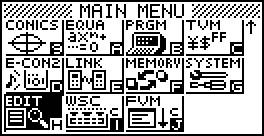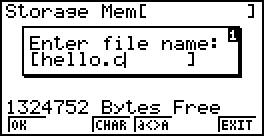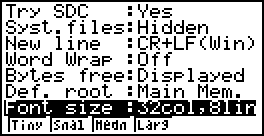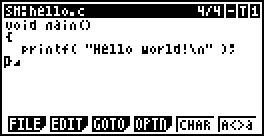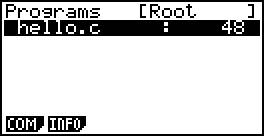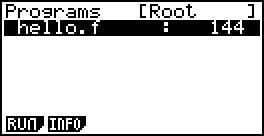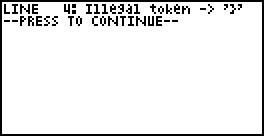WSC and FVM
|
Hello !
New version (1.3) will be released in next days, stay tunned.
|
Contents
- 1 Getting Started
- 2 WSC Support the C language features
- 3 WSC Error reporting
- 4 Some differences in the WSC with the standard C
- 5 Notice & Tips
- 5.1 int a[10];printf( “%d”, a );
- 5.2 char ch;scanf( “%c”, &ch );
- 5.3 Enter the uppercase letters
- 5.4 FVM will automatically initialize the random number seed
- 5.5 Enter the uppercase letters
- 5.6 Set up multiple strong back
- 5.7 Use a large font in the IO interface
- 5.8 FVM program size limit
- 5.9 FVM execution environment
- 6 List of library functions
- 6.1 WSC Functions
- 6.1.1 void allclr( void )
- 6.1.2 void areaclr( int x1, int y1, int x2, int y2 )
- 6.1.3 void arearev( int x1, int y1, int x2, int y2 )
- 6.1.4 void putdisp( void )
- 6.1.5 void setpoint( int x, int y, char kind )
- 6.1.6 int getpoint( int x, ing y )
- 6.1.7 void drawline( int x1, int y1, int x2, int y2 )
- 6.1.8 void clearline( int x1, int y1, int x2, int y2 )
- 6.1.9 void drawcircle( int x, int y, int r )
- 6.1.10 void fillcircle( int x, int y, int r )
- 6.1.11 void drawbox( int x1, int y1, int x2, int y2 )
- 6.1.12 void fillbox( int x1, int y1, int x2, int y2 )
- 6.1.13 void locate( int x, int y )
- 6.1.14 void print( char *str )
- 6.1.15 void printxy( int x, int y, char *str, int type )
- 6.1.16 void printmini( int x, int y, char *str, int type )
- 6.1.17 void savedisp( char num )
- 6.1.18 void restdisp( char num )
- 6.1.19 void popupwin( int n )
- 6.1.20 int openfile( const char *name, int mode )
- 6.1.21 int readfile( int handle, void *buf, int size, int readpos )
- 6.1.22 int writefile( int handle, void *buf, int size )
- 6.1.23 int seekfile( int handle, int pos )
- 6.1.24 int closefile( int handle )
- 6.1.25 int getfree( int type, int *freebytes )
- 6.1.26 int getsize( int handle )
- 6.1.27 int createfile( const char *name, int size )
- 6.1.28 int createdir( const char *name )
- 6.1.29 int deletefile( const char *name )
- 6.1.30 int deletedir( const char *name )
- 6.1.31 int findfirst( char *pathname, int *handle, char *foundname, int *fileinfo )
- 6.1.32 int getkey( int *keycode )
- 6.1.33 int waitkey( void )
- 6.1.34 int iskeydown( int keycode )
- 6.1.35 void sleep( int millsecond )
- 6.2 File name format
- 6.3 Keycode
- 6.1 WSC Functions
- 7 Feedback
- 8 Changelog
Getting Started
Copy the two files inside the bin folder (WSC.g1a, FVM.g1a) to the calculator. In order to edit the source code on calc, you may need to use the EDITv1.51, of course, you can also edit the source code on the computer, it is plain text.
After the installation is complete, the main menu should be as follows:
Making a hello world
Open the EDIT, the storage Mem (Warning: Do not use the Main Mem) and create a new document.
Enter the text:
void main( )
{
printf( “Hello World!\n” );
}
(P.S. EDIT could adjust the font size(shift--set up to enter the setting interface), you can see more code on a screen by using the small font, it is recommended to use the small print,the recommended settings below)
The input is completed as follows:
To compile the file, exit, enter the WSC, press the F1 (compile) to compile the source code.
If there are no errors, the screen will output “Done”, if there are some errors, you can go back to EDIT to modify. After compiling, enter FVM, press F1(run) to run the bytecode file. the screen will output “hello world”
WSC Support the C language features
The operator
+ - * / % += -= *= /= < <= > >= == != && || ! != &
note the last ‘&’ is geting address but not bitwise and
Data type
int char float mult-dimensions array pointer(can’t point to array) string constant
Statement
if else while for return break
Notes
C style /*............*/ and C++ style //............
The function
supports recursion, a detailed list of library functions, see library section
Preprocessor
Simple macro replacement (with parameters) a #define, #include (not a real file contains internal use only)
WSC Error reporting
The error reporting of WSC is not perfect,
WSC will displayed the error message when the error is detected, as below:
You can press menu key to exit and go back to modify source code. If you press any other key, the next error message will be displayed.
Note that WSC did not prompt a warning!
Any pointers, arrays are the same in its eyes,
Any assignment between int, char, float will not generate any errors.
A function that return type is not ‘void’ don’t return a value will not generate any errors.
Some differences in the WSC with the standard C
There ary some differences between the WSC and the standard C.
Doesn’t require the function declaration
As long as the function is defined in the file, regardless of location, you can call anywhere.
Only two scopes
The program has only two scopes, global scope and local scope of funcion.
void main()
{
int a;
{
int a;
}
}
the example program will recerve an error message “Variable ‘a’ redefinition”
int * a, b;
a and b will both be a pointer.(so, it recommended that written int* a, b; but not int *a, b;);
int *p; p++;
The actual value of p will add 4(i.e. sizeof(int) ) in the ANSI C, but WSC will only let p add 1
char s[50] = “asdfjkl”;
This initialization is not yet supported, sample sentence is wrong.
int a[2][2] = { 1, 2, 3, 4 };
This initialization is not yet supported, sample sentence is wrong.
Mult-idimensional array initialization must be grouped properly, such as
int a[2][2] = { {1, 2}, {3, 4} };
the follow is alse correct:
int a[2][2] = { {1}, {3} };
Notice & Tips
int a[10];printf( “%d”, a );
The programmer’s intent is to get the value of a. But as mentioned above, all the pointer are the same in WSC, WSC see a as a pointer to char. so some errors occur.
a correct way as follw:
int a[10]; int t = a; printf( “%d”, t );
char ch;scanf( “%c”, &ch );
For some reasons, the statement is wrong, it is recommended to use getchar();
Enter the uppercase letters
Press F6 in the input interface, than you can enter the uppercase letters
FVM will automatically initialize the random number seed
Don’t require the programmer calling srand();
Enter the uppercase letters
Press F6 in the input interface switch case
Set up multiple strong back
#progma FORCE_BREAK
add the statement above in the source code, then you can hold down F1 + F2 + F6 to force quit the running program.
Use a large font in the IO interface
# progma BIG_FONT
The above statement can be added anywhere in the source code
FVM program size limit
FVM procedure 10kb (not source code, is the f files), if your program is outside this range, use exefvm function
FVM execution environment
The default memory (in this case refers to a static area and stack area) 8kb, you can redefine the following statement
#progma RAM_SIZE 10240 // set to 10240kb = 10kb
The size of the heap area depends on the calculator
If you need exefvm other programs, it is recommended call program RAM_SIZE set
List of library functions
note printf, sprintf, scanf, sscanf are overloading functions, they don’t have variable argument list
stdio.h |
int printf( char *format, int val ) |
int printf( char *format, float val ) |
|
int printf( char *format, char* val ) |
|
int sprintf( char *buffer, char *format, int val ) |
|
int sprintf( char *buffer, char *format, float val ) |
|
int sprintf( char *buffer, char *format, char* val ) |
|
int scanf( char *format, int *address ) |
|
int scanf( char *format, float *address ) |
|
int scanf( char *format, char *address ) |
|
int sscanf( char *buffer, char *format, int *address ) |
|
int sscanf( char *buffer, char *format, int *address ) |
|
int sscanf( char *buffer, char *format, float *address ) |
|
int getchar( void ) |
|
int putchar( int c ) |
|
ctype.h |
int isalnum( int c ) |
int isalpha( int c ) |
|
int iscntrl( int c ) |
|
int isdigit( int c ) |
|
int isgraph( int c ) |
|
int islower( int c ) |
|
int isprint( int c ) |
|
int ispunct( int c ) |
|
int isspace( int c ) |
|
int isupper( int c ) |
|
int tolower( int c ) |
|
int toupper( int c ) |
|
math.h |
float acos( float x ) |
float asin( float x ) |
|
float atan( float x ) |
|
float atan2( float x, float y ) |
|
float cos( float x ) |
|
float sin( float x ) |
|
float tan( float x ) |
|
float cosh( float x ) |
|
float sinh( float x ) |
|
float tanh( float x ) |
|
float log( float x ) |
|
float log10( float x ) |
|
float modf( float x, float *y ) |
|
float pow( float x, float y ) |
|
float sqrt( float x ) |
|
float ceil( float x ) |
|
float fabs( float x ) |
|
float floor( float x ) |
|
float fmod( float x, float y ) |
|
stdlib.h |
float atof( char *str ) |
int atoi( char *str ) |
|
int rand( void ) |
|
#define RAND_MAX 32767 |
|
void srand( int seed ) |
|
void *calloc( int nelem, int elsize ) |
|
void *malloc( int size ) |
|
void *calloc( void *ptr, int size ) |
|
void free( void *ptr ) |
|
int abs( int x ) |
|
string.h |
void memcpy( void *p1, void *p2, int n ) |
char *strcpy( char *s1, char *s2 ) |
|
char *strncpy( char *s1, char *s2, int n ) |
|
char *strcat( char *s1, char *s2 ) |
|
char *strncat( char *s1, char *s2, int n ) |
|
int memcmp( void *p1, void *p2, int n ) |
|
int strcmp( char *s1, char *s2 ) |
|
int strncmp( char *s1, char *s2, int n ) |
|
void *memchr( void *p, int c, int n ) |
|
char *strchr( char *s, int c ) |
|
int strcspn( char *s1, char *s2 ) |
|
char *strpbrk( char *s1, char *s2 ) |
|
char *strrchr( char *s, int c ) |
|
int strspn( char *s1, char *s2 ) |
|
char *strstrr( char *s1, char *s2 ) |
|
void memset( void *s, int c, int n ) |
|
int strlen( char *s ) |
|
void *memmove( void *s1, void *s2, int n ) |
WSC Functions
To use the following functions and definitions, include fxlib.h
All the graphing function draw to VRAM, programmer should use putdisp() to put VRAM to Display Driver.
The range fo abscissa(x) of pointers is from 0 to 127.
The range fo ordinate(y) of pointers is from 0 to 63.
void allclr( void )
Clear the whole area
void areaclr( int x1, int y1, int x2, int y2 )
Clear the specified area
(x1, y1) is the upper-left conner of rectangle. (x2, y2) is the lower-right corner of rectangle.
void arearev( int x1, int y1, int x2, int y2 )
Reverses a specified area
(x1, y1) is the upper-left conner of rectangle. (x2, y2) is the lower-right corner of rectangle.
void putdisp( void )
Put all data from VRAM to Display Driver.
void setpoint( int x, int y, char kind )
Set or erase a dot at the specified position.
If you set point to 1 then the dot is made black. If you set point to 0 then the dot is cleared.
int getpoint( int x, ing y )
Checks a dot at the specified position
If the dot at the specified position is black then this function returns 1. If the dot at the specified position is white then this function returns 0.
void drawline( int x1, int y1, int x2, int y2 )
Draws a line from (x1, y1) to (x2, y2)
void clearline( int x1, int y1, int x2, int y2 )
Draws a white line from (x1, y1) to (x2, y2)
void drawcircle( int x, int y, int r )
Draws a circle at (x,y)
void fillcircle( int x, int y, int r )
Draws a filled circle at (x,y)
void drawbox( int x1, int y1, int x2, int y2 )
Draws a box, (x1, y1) is the upper-left conner of rectangle. (x2, y2) is the lower-right corner of rectangle.
void fillbox( int x1, int y1, int x2, int y2 )
Draws a filled box, (x1, y1) is the upper-left conner of rectangle. (x2, y2) is the lower-right corner of rectangle.
void locate( int x, int y )
Makes settings for the location of the display cursor
The range of x is from 1 to 8, the range of y is from 1 to 21 here.
void print( char *str )
Displays a character string at the current position of the display cursor
void printxy( int x, int y, char *str, int type )
Displays a character string at the specified position.
If you set the type to 0 then the character string is displayed in normal color. If you set the type to 1 then the character string is displayed in reverse color.
void printmini( int x, int y, char *str, int type )
Displays a small font character string at the specified position.
The following definitions are declared for type:
| MINI_OVER | Overwrite (fill) |
| MINI_OR | OR |
| MINI_REV | Reverse color |
| MINI_REVOR | OR in reverse color |
( printmini( 1, 1, “hello”, MINI_OVER ); )
void savedisp( char num )
Saves a screen image in the system area.
Num is the ID of the save area. It can only be SAVEPAGE1, SAVEPAGE2 or SAVEPAGE3.
( savedisp( SAVEPAGE1 ); )
void restdisp( char num )
Restores a screen image in the system area.
Num is the ID of the save area. It can only be SAVEPAGE1, SAVEPAGE2 or SAVEPAGE3.
( restdisp( SAVEPAGE1 ); )
void popupwin( int n )
Displays a popup window of the specified size of lines. Also, the inside of the popup window is cleared.
The range of n is from 1 to 5.
int openfile( const char *name, int mode )
opens an existing file
name is the file name (File Name Format)
mode specifies the action to open. The following definitions are declared for open mode.
| OPEN_R | Read |
| OPEN_W | Write |
| OPEN_RW | Read and write |
If the function succeeds, the return value specifies a file handle. It is greater than or equal to 0.
If the function fails, the return value is an error code. It is a negative value.
int readfile( int handle, void *buf, int size, int readpos )
handle is the return value of openfile()
size is the bytes to be read from the file.
readpos is the starting position to read. If the readpos parameter is -1, this functi on reads data from the position last read ended. If the readpos parameter greater than or equal to 0, this function reads data from the position indicated by the readpos parameter.
If the function succeeds, this function returns the number of bytes actually read. It is greater than or equal to 0.
If the function fails, the return value is an error code. It is a negative value.
int writefile( int handle, void *buf, int size )
handle is the return value of openfile()
If the function succeeds, this function returns the number of bytes actually read. It is greater than or equal to 0.
If the function fails, the return value is an error code. It is a negative value.
int seekfile( int handle, int pos )
moves the file pointer of an open file
If the function succeeds, this function returns the number of bytes that can continuously be read. It is greater than or equal to 0.
If the function fails, the return value is an error code. It is a negative value.
int closefile( int handle )
closes an open file handle
int getfree( int type, int *freebytes )
retrieves the size of the free space, in bytes, of the specified device
The following definitions are declared for type.
| MAIN_FREE | main memory |
| STO_FREE | storage memory |
| SD_FREE | sd card |
( getfree( SD_FREE, &size ); )
freebytes is the pointer to the size of the free space
If the function succeeds, this function returns 0.
If the function fails, the return value is an error code. It is a negative value.
int getsize( int handle )
retrieves the size, in bytes, of the specified file.
int createfile( const char *name, int size )
Creates a file (View File Name Format)
If the function succeeds, the return value is 0.
If the function fails, the return value is an error code. It is a negative value.
int createdir( const char *name )
Creates a directory (View File Name Format)
If the function succeeds, the return value is 0.
If the function fails, the return value is an error code. It is a negative value.
int deletefile( const char *name )
Delete a file (View File Name Format)
If the function succeeds, the return value is 0.
If the function fails, the return value is an error code. It is a negative value.
int deletedir( const char *name )
Delete a directory (View File Name Format)
If the function succeeds, the return value is 0.
If the function fails, the return value is an error code. It is a negative value.
The following three functions need to used in conjunction, for example, see the example\find.c
int findfirst( char *pathname, int *handle, char *foundname, int *fileinfo )
pathname is to find the path (View File Name Format), you can use the wildcard "*", "\\\\fls0\\*.txt", 、"\\\\fls0\\*"
File find handle pointed to by handle int (used the findnext and findclose)
foundname will be saved to find the name of the file
The fileinfo maintain to find the file information, it should be a size 6 int array (int the fileinfo [6]), information storage location in the table below
(under construction)...
int getkey( int *keycode )
Performs a key wait and returns a value indicating the pressed key
If there are no characters in the key buffer, this func tion waits until a character arrives and then returns immediately.
Even if the menu key pressed, this function does not return menu key code. The system processes the menu key event.
Off event, Auto Power Off event, and contrast adjustment are also handled by this function. If an off or Auto Power Off event occurs the application will not be notified. Once the calculator is turned back on control is returned to the GetKey function.
If a character key was pressed, the return value is 1.
If a control key was pressed, the return value is 0.
int waitkey( void )
Wait for a key, and return the key code.
It is a simplify of getkey
(View key code)
int iskeydown( int keycode )
Checks whether the specified key is pressed.
The parameter is a key code of the key that you check.
When you wait events only by this function, the calculator never turns off. Only use this function when you need to wait for key input to continue.
If the specified key is pressed, the return value is 1.
If the specified key is not pressed, the return value is 0.
(View key code)
void sleep( int millsecond )
Suspends the execution of the current thread for a specified interval.
File name format
A few examples to illustrate the format of the file name:
File named 2.txt in the Storage Mem in the root directory is "\\\\fls0\\2.txt"
File named 2.txt in the directory book in the Storage Mem is "\\\\fls0\\book\\2.txt"
File named 2.txt in the root directory of the SD card is "\\\\crd0\\2.txt"
Directory book in SD card is “\\\\crd0\\book”
In this moment you can’t operate the file in Main Mem
Note that the filename is case sensitive!
\exemple\FILE.c shows how to operate file
Keycode
The following definitions are declared for some common key in fxlib.h
#define KEY_UP 30018 #define KEY_DOWN 30023 #define KEY_LEFT 30020 #define KEY_RIGHT 30021 #define KEY_EXIT 30002 #define KEY_AC 30015 #define KEY_DEL 30025 #define KEY_EXE 30024 #define KEY_SHIFT 30006 #define KEY_ALPHA 30007 #define KEY_MENU 30003 #define KEY_OPTN 30008 #define KEY_F1 30009 #define KEY_F2 30010 #define KEY_F3 30011
\example\KEYCODE.c shows how to get the key code of other keys
Feedback
If you found bugs, or have any suggestions, questions, you can post it at WSC and FVM Thread.
Special thanks to yangsc825 (testing and recommendations), helder7 (English documentation), Kenneth C. Louden ("Compiler Construction Principles and Practice").
Changelog
* 2012-07-06 version 1.3
- Add overclocking, RTC functions and perform the function of the FVM program
(Function names are cpuspeed, readrtc, setrtc, findfirst, findnext, findclose, exefvm, getfvmmsg)
- Add a bit manipulation functions (for the realization of convenience, make it functional form rather than the operator)
(Name of the function distribution is bitand, bitor, bitxor, bitnot, shiftl, shiftr)
- Add the support of the hexadecimal constants
- Add the font of the IO interface support See tips
- Optimization of the source code of the FVM (thanks to chuxianbing)
- Fixed some of the errors of the optimization techniques
- Canceled automatically initialize the random number seed (time function)
- Other
* 21-06-2012 version 1.2
- Add a simple pre-processor (now the #include)
- Add file manipulation and plotting functions
- Add to the bond strength rewind functions
- Add an optimized technology, test data, maximum speed increased by 10%
- Fixed some errors in the parameter passing
- Fix array initialization can only occur once error
- Fixed the error of the multidimensional array address
- Others...
* 07-06-2012 version 1.1
- Add most of 9860 to support the standard C function
- Add a full description of document
- Add multi-dimensional array initialization
- Add transfer the character '\ t'
- Improve the stdio, to support multi-line input, uppercase letters
- Improve the error message, more friendly
- Fixed main, not the return 0 mistakes
- Fixed errors in some of the parameters passed
- Fixed a global variable, function, character constants can not be the same name error
- Repair evaluation stack stack stack error
- Other
* 28-05-2012 version 1.0
- Preview Release
